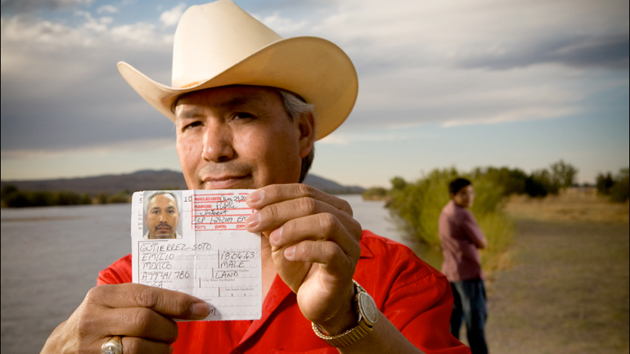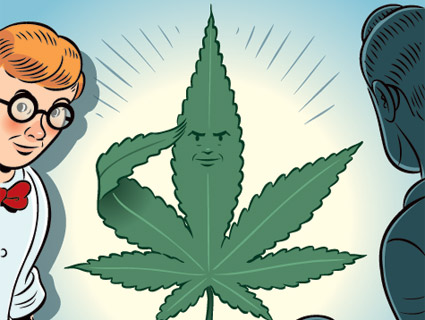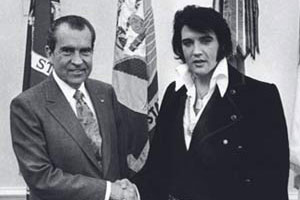AMONG OUR LEADERS in Washington, who’s been the biggest liar? There are all too many contenders, yet one is so floridly surreal that he deserves special attention. Nope, it’s not Dick Cheney or Alberto Gonzales or John Yoo. It’s a trusted authority figure who’s lied for 11 years now, no matter which party held sway. (Nope, it’s not Alan Greenspan.) This liar didn’t end-run Congress, or bully it, or have its surreptitious blessing at the time only to face its indignation later. No, this liar was ordered by Congress to lie—as a prerequisite for holding the job.
Give up? It’s the head of the Office of National Drug Control Policy (ONDCP), a.k.a. the drug czar, who in 1998 was mandated by Congress to oppose legislation that would legalize, decriminalize, or medicalize marijuana, or redirect anti-trafficking funding into treatment. And the drug czar has also—here’s where the lying comes in—been prohibited from funding research that might give credence to any of the above. These provisions were crafted by Dennis Hastert (R-Ill.) and Bob Barr (R-Ga.) and pushed for by then-czar Barry McCaffrey, best remembered for being somewhat comically obsessed with the evils of medical marijuana. A few Dems complained that the bill, which set “hard targets” of an 80 percent drop in the availability of drugs, a 60 percent decrease in street purity, and a 50 percent reduction in drug-related crime and ER visits, all by 2004—whoops!—was “simplistic” and “designed to achieve political advantage.” Though the vote count was not recorded for history, it got enough bipartisan support to be signed into law by Bill “Didn’t Inhale” Clinton.
If this tale strikes you as the kind of paranoid fantasy you’d expect from someone who’s taken one too many hits off the joint, consider that it isn’t the most bizarre, hypocritical, counterproductive moment in our nation’s history with drugs. Not by a long shot. Consider that Prohibition came about when progressives got into bed with the Ku Klux Klan, but was rolled back once they’d had enough of the Mob. Or that the precursor to today’s drug czar supplied morphine to Sen. Joe McCarthy because he worried about the national security consequences—not of the red-baiter’s habit, but of its potential exposure. Or that drug war progenitor Richard Nixon ordered a comprehensive study on the perils of marijuana, and then ignored the study once he learned it recommended decriminalization.
But then, the drug war has never been about facts—about, dare we say, soberly weighing which policies might alleviate suffering, save taxpayers money, rob the cartels of revenue. Instead, we’ve been stuck in a cycle of prohibition, failure, and counterfactual claims of success. (To wit: Since 1998, the ONDCP has spent $1.4 billion on youth anti-pot ads. It also spent $43 million to study their effectiveness. When the study found that kids who’ve seen the ads are more likely to smoke pot, the ONDCP buried the evidence, choosing to spend hundreds of millions more on the counterproductive ads.)
What would a fact-based drug policy look like? It would put considerably more money into treatment, the method proven to best reduce use. It would likely leave in place the prohibition on “hard” drugs, but make enforcement fair (no more traffickers rolling on hapless girlfriends to cut a deal. No more Tulias). And it would likely decriminalize but tightly regulate marijuana, which study after study shows is less dangerous or addictive than cigarettes or alcohol, has undeniable medicinal properties, and isn’t a gateway drug to anything harder than Doritos. (Watch Clara discuss the Doritos theory at the 00:12:54 mark of this video, and see “The Patriot’s Guide to Legalization.”)
So why don’t we have a rational drug policy? Simple. Forget the Social Security “third rail.” The quickest way to get yourself sidelined in serious policy discussion is to stray from drug war orthodoxy. Even MoJo has skirted the topic for fear of looking like a bunch of hot-tubbing stoners. Such is the power of the culture wars, 50 years on.
There is some hope. We have, at long last, a post-boomer president, one who confidently admits he partook back in the day. And while Barack Obama has said he’s not interested in overhauling drug policy, his administration has made moves toward honesty—acknowledging that US demand fuels overseas production, that federal raids on medical marijuana dispensaries are a waste of time and money, and that treatment should be our top priority; the Pentagon has even said that Mexico rivals Pakistan atop the list of states most likely to fail. There are other signs of a thaw: Those noted hippies at The Economist and Foreign Policy have called for ending “prohibition at any cost.” Drug warrior Bob Barr is lobbying for the Marijuana Policy Project. And Joe Biden—who helped create the 100:1 crack-vs.-coke sentencing disparity—has finally issued a mea culpa.
Meanwhile, the new drug czar, Gil Kerlikowske—the first since moralizer-in-chief William Bennett not to hold Cabinet-level status—has even dared suggest that the phrase “War on Drugs” be retired. But Kerlikowske still remains bound by the 1998 mandate prohibiting him from speaking the truth. If we want a sensible drug policy, ditching the liar’s law would be a good start.














